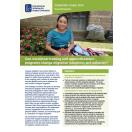What works in addressing the needs of street-connected children and young people
Street-connected children and young people (SCCYP) are vulnerable to a range of risks. Their exclusion from mainstream opportunities, such as education and employment, as well as settled relationships may impede their long-term life chances.
To understand what works in promoting reintegration and reducing harmful and lifestyles in SCCYP, 3ie funded a systematic review to examine the evidence on the effectiveness of interventions.
Main findings:
- Therapeutic did not have better outcomes than SCCYP receiving usual services such as rooms, free meals, clothes, health and counselling services.
- Family therapies are effective for certain outcomes related to substance use and
delinquent . - SCCYP more receptive to services that proved challenging and were tailored to their needs and goals.
- There were shortcomings in the professional and material support available to service providers in L&MICs. Practitioners reported a lack of competence in reaching out to girls and young women.




